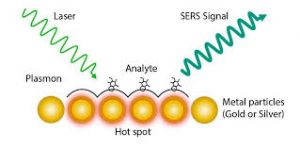Surface-Enhanced Raman Spectroscopy:

Researchers have developed an efficient nano catalyst which can be used in in environmental remediation, nanoscale electronics, and surface-enhanced Raman spectroscopy (SERS).
- Surface-enhanced Raman spectroscopy or surface-enhanced Raman scattering (SERS) is a surface-sensitive technique that enhances Raman scattering by molecules adsorbed on rough metal surfaces.
- It enhances the Raman scattering signals of molecules close to nanostructured metallic surfaces, typically gold or silver.
- It provides the same information that normal Raman spectroscopy does, but with a greatly enhanced signal.
- It has become a powerful tool in chemical, material and life sciences, owing to its intrinsic features.
- Raman spectroscopy is a spectroscopic technique used in condensed matter physics and chemistry to study vibrational, rotational, and other low-frequency modes in a system.
- It depends on the inelastic scattering, or Raman scattering of monochromatic light, usually from a laser in the visible, near-infrared or near-ultraviolet range of electromagnetic spectra.




